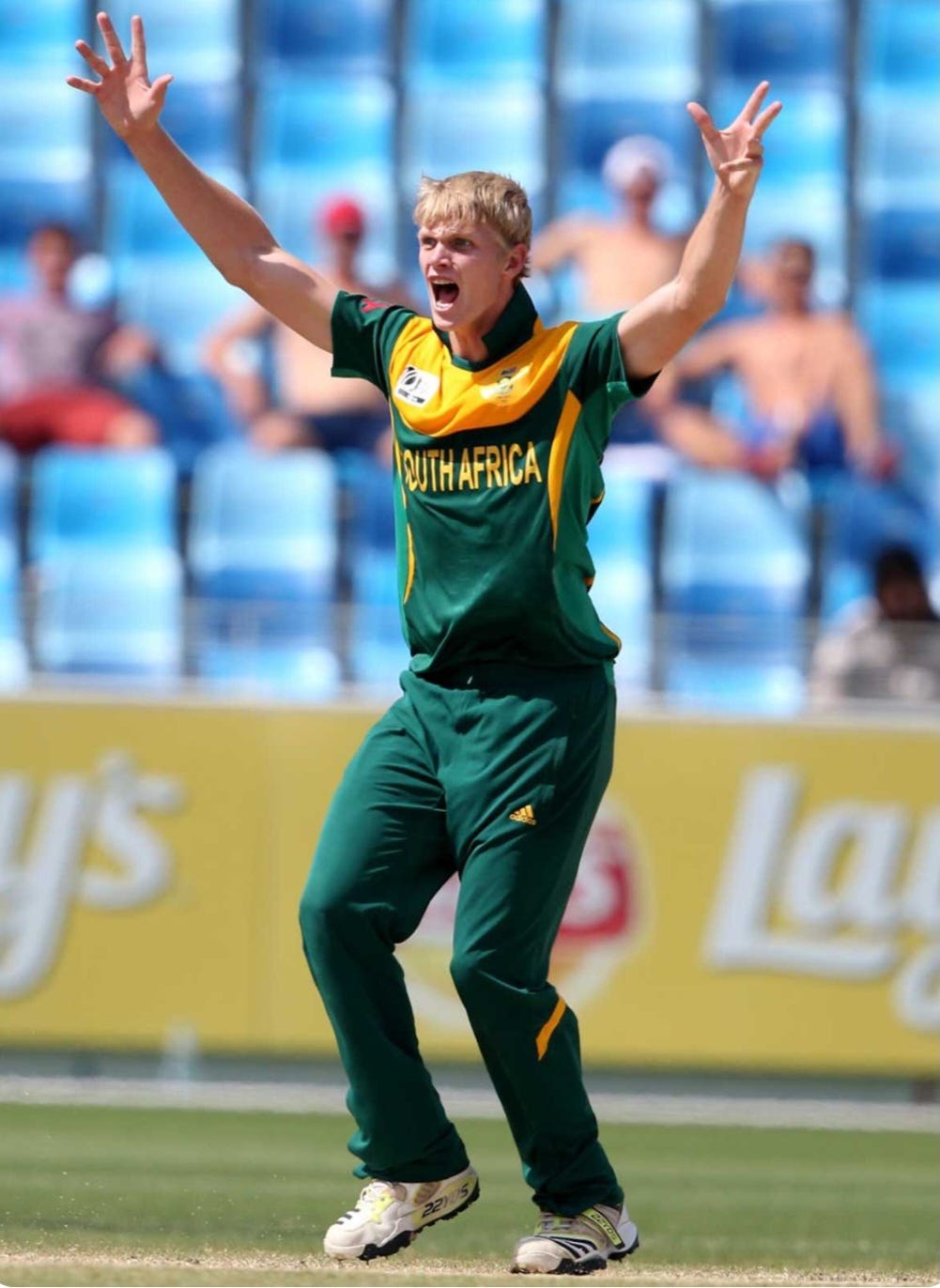Good things happen when Corbin Bosch takes four wickets in an innings. That might be why he has more four-fers than five-fers in his career.
Nick Loupos realised that the team hadn't just set the playbook aside but binned it when he saw Corbin Bosch at the top of his mark, ready to bowl his second over. Dustin Melton had bowled the first over and Bosch was taking the second. Bosch and Melton were to Pretoria Boys High School (PBHS) what Bosch's father, Tertius, and Anton Ferreira were to Northern Transvaal in the late 1980s. Tertius and Ferreira terrorised batters with their fast and faster dynamic.
During the innings break, Loupos had recommended that his side open with medium pacers. PBHS was defending a low score of 196 runs. The key to defending such a total was in limiting boundaries in the powerplay and removing pace was a good start. However, his captain, Aiden Markram, and the rest of the leadership group (which also included, Bosch, Shane Horsley and Jamie Gous) decided otherwise.
Years later, Ray Jennings, would share that Bosch and Markram were part of the brains trust of the u19 World Cup-winning side. According to the coach, Markram, Bosch and Kagiso Rabada were the three guys who helped him make the opposition struggle on the field. Loupos had faith in his leadership group, he encouraged them to be independent thinkers.
Melton terrorised the Maritzburg College batters with pace - he was one of the fastest schoolboy bowlers in the country. He made life difficult for the batters with a few deliveries into the body. Bosch's beehive showed that he operated in the channel outside off stump. Bosch was unplayable when he zoned in on that line.
"He knicked a lot of batsmen off. The problem was that we didn't have enough good slip fielders outside the 'keeper. Aiden & Corbin were our best catchers, but Aiden usually fielded at extra cover or cover point, or short in front of the wicket," Loupos shared.
Horsley, the PBHS wicketkeeper, had no trouble with fine edges. He pouched all of them. They struggled with thicker edges, the ball flew past the slip cordon. Had they had better slip fielders, Bosch would've taken 30 wickets more than he finished his PBHS first-team career with. However, despite the inadequate slip fielding, Bosch bagged a record 92 wickets for PBHS Boys High. That record stood for four years and was broken in 2016 by Kiel van Vollenhoven...but by that stage, the PBHS was playing more games.
The former PBHS coach doesn't take credit for Bosch's accuracy. It was a skill he already possessed when they started working together.
"I first paid attention to his bowling when he made the PBHS first team. What stood out for me was his control. He had very good command of his line and his length, which was very impressive for a schoolboy. But he wasn't just a line-and-length medium pacer. He had gas and was quick for a schoolboy. There were others who were faster than him, but with nowhere near the same control that he had," Loupos shared.
Bosch and Melton reduced Maritzburg College to 21/7 after 10 overs. Bosch had four wickets and Melton three. The duo wasn't required to bowl again in the match. PBHS secured a 96-run win. Bosch finished with 4/16 and Melton 3/22.
Pierre du Bruyn and Corbin Bosch broke down Bosch's bowling action. Bosch was one of the two youngsters Pierre du Bruyn recruited to the Tuks Academy in his third year at the institute. The other was Aiden Markram. Neither was a student at the University of Pretoria at the time. Markram was the leading run-scorer in the Northerns school district and Bosch was arguably the best all-rounder.
"I followed Corbin's career and felt he was a good prospect for the future. Corbin and I had a chat about his education and career and cricket career. I had to explain to him how it would look like if he went through the Tuks Academy. He didn't show any reluctance, bought in and was committed to that concept of starting right after school as a gap year," du Bruyn shared.
Bosch's bowling wasn't a mess, however, there were a few technical issues that they needed to correct. His approach to the crease was one of those things. Breaking everything down also helped Bosch to understand his action better, and thus be in a position to be more effective.
Coaches get excited when they are working with a talented youngster. So much so that it's easy to get carried away. Du Bruyn was more cautious. The range between 18 and 23 is a high risk stage. It's a growth period. Bowlers are susceptible to injuries in that phase of their development. There isn't a one size fits all approach because people develop at different rates, with others on either end of faster or slower than normal.
"It was important not to rush things but practice patience. We needed to get him on par and strong in certain parts of his body, especially his core," du Bruyn explained.
After that, Bosch and du Bruyn spent weeks of living through groundhog day. Bosch repeated the same drills day after day until the actions became a habit, until they became natural and smooth. However, Bosch's development was not linear, in part because he pushed himself too hard. It didn't take du Bruyn long to catch on.
"Corbin was one of those players that was really under my wing in terms of not just developing him as a cricketer but as a young person in the cricket industry," the coach shared.
The pair spent a lot time between sessions building up Bosch's self-confidence. Bosch spent the first year improving. When the two sections, mind and body, worked together, Bosch produced scintillating performances. In 2014, he bagged three wickets to help Tuks win the Red Bull Campus World Cup at the Kia Oval, UK.
However, his best moment was when he bowled South Africa u19 to the title at the 2014 u19 World Cup. He bagged 4/15. His performance earned the Player of the Match award.
Corbin Bosch bowled 90 legal deliveries in his maiden innings as a Test player. The first one, which got him a wicket, was immediately after the morning drinks break and the last went for two runs in the final over before tea. His speed hovered around 144, 145 and 146 kph. He finished the innings with four wickets for 63 runs at 4.2 runs an over. It was, all in all, a good debut.
However, it was his 67th delivery that got the old heads talking. It was full and straight. Naseem Shah presented his bat to it, with the intent to loft it back over the bowler's head. However, it was faster than Naseem had accounted for. The ball caught the top part of Naseem's bat as he lobbed it to Kagiso Rabada at mid-on.
Cricketers who played in the Northern Transvaal (now Titans) region in the mid-1980s had seen another Bosch ruffle batters with pace. George Luis was one of those players. He watched the delivery and sunk into nostalgia like a love-seat tailor-made for his body
Luis didn't see the ball before it rapped him on the pads. He had kept his eyes on it when Tertius Bosch stood at the top of his run-up and had them locked in on it as Tertius bounded towards him. And then the ball disappeared at the point of delivery and the next thing he knew, the ball struck him on the shins, knocking him off balance.
It was in that moment that he understood what Keith Verdoorn had tried to tell them a week earlier. Verdoorn had faced Tertius in the nets at Tuks and walked away shaken. When he attempted to share the experience with his club teammates, he hadn't been able to find the words. He compressed it into a 14-word sentence: " Boys, I've just seen the fastest white man alive, and he's playing for Tuks."
Luis failed to make contact or steal a bye as he survived 11 more deliveries of Tertius' new ball spell. Batters want to stay in for as long as possible, however, for the first and last time in club cricket, Luis was grateful to Anton Ferreira for dismissing him. The pacer took him out of his misery. Almost 40 years later, Luis insists Tertius bowled at 3 million miles per hour.
Naseem Shah wouldn't go as far as suggesting that Bosch was going at 3 million miles per hour. He would probably have a more accurate estimate of the pacer's pace. However, like Luis and anyone else who faced Tertius, he would admit that the delivery was unplayable because of its speed. Bosch seemed to have channelled his father's spirit for the wicket. The first three hadn't been off outstanding balls, but this one was wonderful.
And for the umpteenth time in his cricketing journey, Corbin Bosch bagged a four-wicket haul that set his side up for victory.







